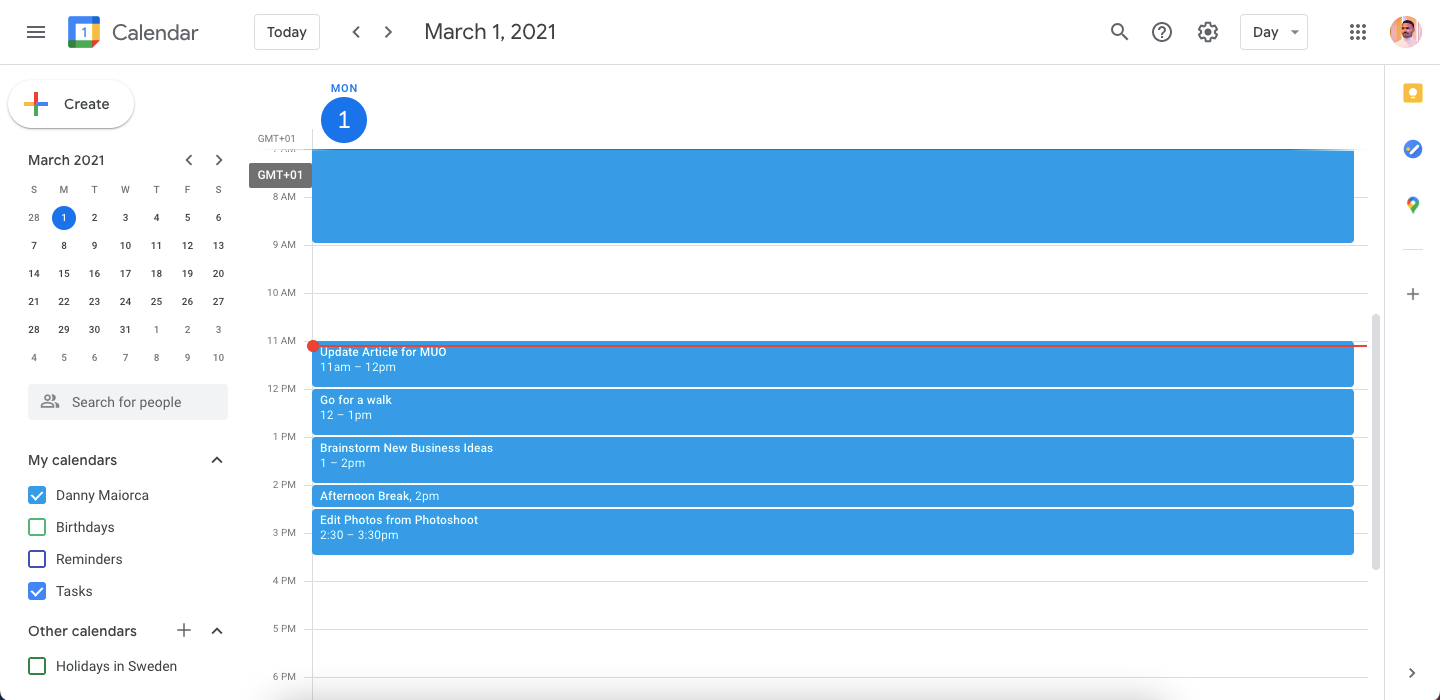If you're familiar with the productivity community or have read Cal Newport's book Deep Work, you'll probably have heard of the term time blocking.
By spending 15 to 20 minutes each day preparing your calendar for the next one, Newport claims that you can get the same amount of work done in a 40-hour, time-blocked week as you would in a 60-hour, unplanned one.
Are you looking to get more done each day? Keep reading, because this article will show you how to do that with time blocking.
1. Allocate Some Planning Time
The first thing you need to do is spend a short amount of time setting out what you need to complete before the week is over. Decide what makes for a week well spent.
Start by writing down between three and five of the most important tasks you need to complete. Decision-making apps might help to make this easier
Once you've outlined the essentials, note any other essential tasks that aren't as vital as your priorities.
If you work an eight-hour day, split it into different-sized chunks. It would help if you dedicated each of these slots to a specific task or set of tasks. Google Calendar is great for this, but a pen and paper will also work. Alternatively, you might want to try another calendar app.
2. Be Honest With Yourself
Don't try to squeeze too much into one day. It's all too easy to underestimate how long a task will take—especially if you're under the assumption you'll be 50 percent more efficient than usual. If you're someone who's never tracked their time before, this will take a little while to learn.
You need to know exactly how long you can focus on deep, difficult work. If you carve out four hours for deep work but can only really concentrate intensely for two hours, that's two hours wasted that could've been spent on less demanding tasks.
As you learn more about how you work and how long each task takes, your time-block estimations will become more accurate. And in return, you will become more productive.
3. You Can Time Block Reactive Work Too
Do you work in a reactive job? Fear not, because time blocking can still work for you.
If a large portion of your work is spent in your inbox, schedule 30 minutes every two hours in your inbox. (Is this a big deal? Add some information to your signature letting people know that you only check email a few times per day to keep up productivity.)
If you have to take calls throughout the day, instead of answering the phone every time it rings, turn the answering machine on, and schedule a couple of periods during the day where you respond to your messages. This reduces interruptions for other blocks of time, enabling you to get your best work done.
4. Remove Distractions
Time blocking works great in theory. But in reality, you're battling against a lot of distractions. To successfully block your time and stick to a schedule, you need to get rid of anything trying to grab your attention.
Whenever concentrating on a scheduled task, focus on nothing but that scheduled task. Close the Facebook tab, put your phone on Airplane Mode, and tell your colleagues not to disturb you. If you need to, put a pair of headphones on, too.
Don't shift to any other tasks until your time is up for the current one. Often, you'll be surprised at how much you get done.
5. Don't Be Too Specific
Human beings are notoriously bad at predicting how long things will take. If we're too specific with our time blocking ("30 minutes to book a venue for the party"), we've already failed when we don't hit that exact target.
Instead, keep your blocks of time relatively vague—but still working toward a particular goal.
For example, "30 minutes organizing the party" works well. Instead of having a venue booked, the 30-minute block may result in a shortlist of venues—so at least you've made progress!
These quick wins are what keep you motivated for the long haul.
6. Time Blocking Doesn't Mean Lack of Choice
Some people dislike a lack of choices throughout their day and fear that time blocking leads to a complete lack of options. But this doesn't need to be the case.
One good idea is to make your block vague. You can name them things like "create PowerPoint slides" or "write articles" if you've got many tasks to do in one area.
The point isn't to necessarily complete specific tasks in one sitting. It's to progress in areas you need to, regardless of exactly which project you're dedicating time to.
7. Keep Detailed Notes
When regularly switching from one task to another, getting into the swing of the next task can take a long time. To time block successfully, you need to be in the right frame of mind for this.
To do this, consider keeping detailed notes. You can either do this on your Google Calendar or on paper. Mention where you got to last time you worked on a project, the breakthroughs you made, and the next steps for moving forward.
Spend the last few minutes of each time block writing these notes so you can enter the next time block with a clear mind.
8. Perform Regular Reviews
At the end of each week, month, or quarter (whichever is best for you), review the different projects you've been working on to see if your time-blocking approach is working for you and to learn which projects you need to assign more time blocks to. This is the only real way you'll learn how to set your time effectively.
During a review, ask yourself the following questions for each project:
- What did I accomplish since the last review?
- What tasks do I need to complete before the next review?
- At which stage am I at with each of my projects?
With this overview, you'll be in a much better position to make decisions for the future.
9. Understand Your Body Clock
Do a little reading about circadian and ultradian rhythms and learn how to tell which hours of each day are your most productive. Then schedule your time blocks accordingly.
Many people find they're most creative during the early hours. If you know you're able to focus better during the early afternoon, organize your time blocks to make the most of that time for your top priorities of the week.
10. Don't Be Too Professional
All work and no play makes Jack a dull boy. Ensure you schedule time to rest and relax into your days.
Put aside time to spend with your loved one. Time to spend on your own. Time to exercise. Time to go shopping. Time to do nothing. Otherwise, these essential tasks could all fall by the wayside, and you'll find you're up to date when it comes to working, but entirely behind in your personal life.
11. Use Reminders That Work
Whether that's a calendar popup, an email reminder, a timer on your phone, or an old-school stopwatch, you need to ensure that you set up reminders you're confident you'll adhere to. If you're willing to work an extra 10 minutes on each task, you'll soon fall behind on other projects.
Ensure you know when your time block is coming to an end, so you can get into the right frame of mind to move to the next block.
In essence, time blocking is a simple exercise in segregating your day into various chunks of time. If stuck to, it helps us achieve everything we need to, thereby reducing stress.
Sure, there are some problems with motivation, the ability to predict how long things will take, and unforeseen disruptions. But using this method can help us cut procrastination and waste, make for more efficient workdays, and give us back personal time.
Block Your Time to Boost Your Output
In a world of distraction, time-blocking offers a great solution to getting work done while still enjoying your personal life. Mastering the practice may take a while, but you'll get a lot more done in a shorter timeframe once you're there.
The most important thing is to get started. Make a note of your most important goals, start slow and track your progress. Eventually, you'll become a productivity master.




